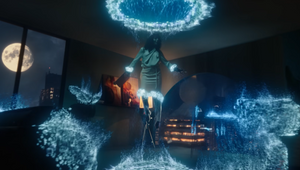
Areej Mahmoud: “Industries Change, but Stories Have Existed Since the Dawn of Humanity”

BIG KAHUNA FILMS, the award-winning creative production house based in Dubai and Beirut, is proud to support creativity across the Middle East. Over the coming months, as part of our sponsorship of LBB’s Middle East edition, we’ll be speaking to some of the great minds driving creativity forward across the region.
Here we catch up with film maker, director and creative Areej Mahmoud. He explains how his childhood propelled him into creativity without even realising it, leaving the advertising world to become a director and why mastering the craft of storytelling is key.
LBB> Growing up in Lebanon, how much did creativity play a part in your childhood?
Areej> I grew up during the Lebanese civil war under challenging conditions. I think nature and art saved my childhood. We lived in a beautiful part of the Lebanon mountains. My mother was always drawing or painting and my father used to read a lot. I was surrounded by nature, books and art supplies. If I wasn’t running over the hills, catching insects, and finding fossilised rocks, I was working on a project or getting lost in my books and drawings.
If it wasn’t for this escape from the toxic environment of the war, I would be a very different person today.
LBB> Tell us about your first advertising role - were there any pieces of work from those early days that stood out to you?
Areej> I was 21. I had a degree in graphic design, but I wanted to make films. The closest thing I could get to creating films was TV commercials. I started working for Leo Burnett as an art director in 2004, on the Procter and Gamble account. I learned a lot from that experience and it propelled my career into advertising.
My first proud moment was a commercial for an anti-hair-fall variant for Pert Plus in 2007. It was my first attempt at telling a story through film. I created the characters and I drew the story board myself. The characters were fallen hairs that I twisted to look like outlines of human figures. It was the story of a genocide. All these hairs are dying, hanging on to a brush, falling into a sink, screaming for their lives, ending with a scene of a bathroom floor full of dead hairs. In the middle, one crying hair holds a dying relative in a position that looks like La Pieta. They ran it on TV for a bit before they realised that it was too weird. But it got shortlisted at Cannes Lions which was a big deal for me at the time.
LBB> Tell us more about your Master’s in Fine Art in Cinema Directing from Columbia College Chicago.
Areej> I knew that I needed to be a better screenwriter if I wanted to be the filmmaker that I would like to be. That was my main driver for this MFA. But I wanted to enrol in a program that offered a balance of writing and directing because directing was always my ultimate goal. The experience turned out to be so much more.
Going back to student life after twelve years in advertising was intimidating. But it also pushed me out of my comfort zone and allowed me to rediscover who I am outside my previous job titles and my work life. I was finally giving myself permission to search for my voice as an artist. I think that was the most valuable result of the experience. Spending time around filmmakers and productions in Chicago and L.A. was also mind-opening about cinema and TV as industry and practice. I think the hardest part of it all was making peace with why I didn’t make this career change earlier. Now I can see that I simply wasn’t ready before. And that is ok. What matters is that I took the plunge.
LBB> After this experience you came back to Lebanon and took up directing, how was this transition? And what made you want to leave the world of traditional advertising agencies?
Areej> The industry has been changing since the day I joined in 2004. And while algorithms can now generate automated targeted ads for brands, they can’t write compelling human stories. Luckily for humanity, I think they never will. My passion has always been in telling stories, and the language of film comes to me naturally. But I don’t like being tied down to an industry.
Industries change, but stories have existed since the dawn of humanity. They are part of who we are as humans. I am a filmmaker and a storyteller regardless of the medium or form in which the story will be told. That’s the craft that I want to master. Directing branded content and commercials is a natural switch for me because it combines my old expertise with my passion for filmmaking, and so it was a smooth transition, and I enjoy it a lot. I only take projects where I feel that I can add value to the story, and the advantage of choosing my own projects is that I can make time for my narrative work.
LBB> How did you start Studio Humbaba?
Areej> Studio Humbaba is the fruit of a partnership between a product developer and a storyteller. My partner Davina Atallah, who comes from a background in design and brand development, made a shift into product development around the same time that I made a shift into screenwriting and directing.
We were both feeling frustrated that the market was forcing us to choose a label that is easy to sell, and that was forcing us to stick with an industry: TV, cinema, publishing, advertising, product design, brand development, or content development, etc… We wanted to be able to explore the range of our craft. We knew that with our combined experience we can pretty much develop and produce any type of product, from idea to market. Studio Humbaba is about craft instead of industry.
At the centre of our craft is the art of story, backed up by our combined experience in design thinking, brand building, communication, and most importantly product development and commerce. We want to develop mindful products that contribute to culture and people around us, with story at the core. We only just started and our projects and clients are already widely diverse. We are developing a branded content series in partnership with an agency and a production company about slowing down and reconnecting with nature. I just finished directing it.
In the works, we have a toy that nurtures emotional and social learning, a TV series centred around themes of human dignity, and a mental health app that enables patients to take back control of their lives. Our projects range from commissions to self-initiated projects. And our collaborators and clients range from multinational companies to early-stage startups and artists.
LBB> What can you tell us about the short films and TV series that you’re writing.
Areej> At the moment development takes up most of my time, and I have a newfound love for writing. It’s exciting for me to start discovering the characters and the places and the mood of the piece, and I can lose myself for weeks in the process. The most frustrating part of the developing process is getting a project made, because it takes time to find the right collaborators who share the vision, find funding, and find creative solutions to make it happen. But there is nothing more rewarding than bringing a story to life, so it’s worth all the difficulties.
I have a TV series in development that is supported by Doha Film Institute, titled “Under This Roof”. It is about living under the house rules of Lebanon, and what life in these conditions reveals about people. Can you change your environment or does your environment change you? That’s the big question of the series. I am now looking for an international co-producer. I am also working on producing a short film that I developed with a talented comedian from Lebanon, in addition to a few experimental pieces.
LBB> I know your short films were recognised at the BAFTA student awards, what did this appreciation mean to you?
Areej> That was my thesis project, a short film titled ‘What Remains’ that circles around the themes of war trauma and immigration. It was a good surprise to get shortlisted for the BAFTA student awards. Recently I was part of a project called Beirut 6:07, a series of short films dedicated to the victims of the August 4 Beirut port blast, that was also nominated for the international Emmy’s. I won’t lie, it always feels good to get a prize, no matter what it is. There is a lot of hard work that goes into any kind of work, and a little recognition doesn’t hurt.
LBB> You split your time now between Lebanon and Dubai, tell us more about the two places as creative hubs.
Areej> Spending time between two countries brings diversity into my work. Each place demands a different approach to storytelling but also to production. The unfortunate events in Lebanon over the past two years have been the fuel for a lot of anger and disappointment, and these emotions made their way into my narrative work. The series that I mentioned, ‘Under This Roof’ explores themes like dignity, corruption, and human cruelty.
I think Lebanon is a great place for filmmaking and art. Unfortunately, it is being transformed into a hostile environment for creative people. Dubai on the other hand is a dynamic city that hosts talent from all over the world. It inspires me to explore local stories that relate to a diverse and global audience, and it pushes me out of the comfort of creating for a local crowd, which is amazing because I find that the best stories are those that explore a universal truth about the human condition. I am dying to work on a piece of fiction that is set in the UAE.
LBB> Finally, what advice would you give young creatives entering the industry now?
Areej> Industries are all about efficiency. Creativity, by definition, is an inefficient process. It needs time and experimentation, and a stimulating environment for the juices to start flowing. And so a creative person is always in conflict with industry. Industries can help you build a career, but if you are not independent in your ideas, you can lose yourself in the demands of the job. My advice to anyone working in a creative field is to always make your work personal. Try to put a piece of yourself out there, even if you feel vulnerable and even if you know that your work will be criticized, or worse: ignored!
That is how a creative person grows. You throw your heart out there and you keep doing that until you learn how it resonates with your audience. You have to give yourself permission to develop your own voice.












